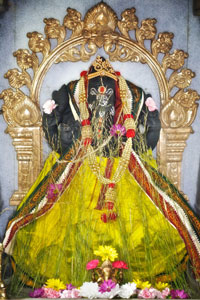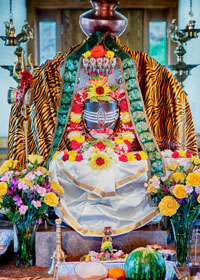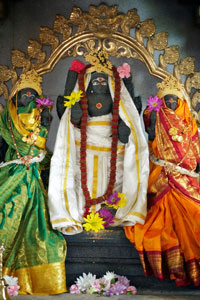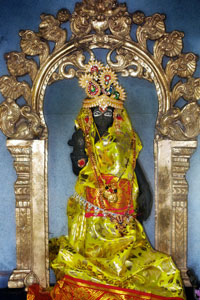 These days, many people both western and eastern, are put off when entering a Vedic temple. Seeing beings with many arms, the head of an elephant, or in the form of a bull just does not make sense to the current modern perspective. Admittedly, as a teenager, I too would have been put off if I was to walk into such a temple. It would have just seemed too strange.
These days, many people both western and eastern, are put off when entering a Vedic temple. Seeing beings with many arms, the head of an elephant, or in the form of a bull just does not make sense to the current modern perspective. Admittedly, as a teenager, I too would have been put off if I was to walk into such a temple. It would have just seemed too strange.
We live in a rational age. Things have to make sense or they are rejected. However, as science advances, things that once made no sense do begin to make sense. For example, a couple hundred years ago, the idea of unity and oneness made no scientific sense. However, with the advent of modern physics, the concept of unity is front and center for many theoretical physicists.
To understand the essential science of the Gods, we can begin to make sense of Vedic knowledge. Yet for the foundation of that understand to be solid, we must start with the basics and build upon them. Few people are willing to do that. Those that have rejected spirituality are rarely willing to take the time. Those who have embraced spirituality feel they have no need. Both perspectives are flawed. The more deeply and fundamentally we understand life and our existence, the better. Just because one believes in God, does not mean it is time to stop learning and discerning. Also, because we have become identified with a particular paradigm does not mean that there are no other valid paradigms. To ignore other paradigms is called ignore-ance. In this day and age of western science, that paradigm should not be ignored. By taking the time to investigate the Vedic paradigm, we can come to see the tremendous value of Vedic knowledge.
So let’s set any aversions or affinities aside for a moment and consider the following. Fundamentally, the Gods are laws of nature. There is a mechanism or mode of operation underlying the universe… they are laws of physics or laws of nature. Each God or Goddess is a particular aspect of the laws of nature, just as addition, subtraction, multiplication, and division are aspects of arithmetic.
 Ganesh
Ganesh
Ganesh is the principle of categories or structure. To compare creation to a crystal, Ganesh would be the molecular structure of the crystal. Ganesh then is the remover of obstacles. By enlivening the underlying structure of life (Ganesh), we strengthen and stabilize our lives thereby removing obstacles to our progress. Ganesh is also the protector of women and children. Sociologically the family structure has traditionally be held together by the bond of mother and child. That family dynamic gives structure to life. So naturally, that is upheld by the principle we call Ganesh.
Watch video: "The Gods" with Michael Mamas – Ganesh
 Shiva
Shiva
There is one basis to all existence… consciousness. Even many modern physicists believe the unified field is quite simply pure consciousness. It is the one thing that births everything. Shiva is that principle, that quality, of oneness… pure consciousness, pure is-ness.
Watch video: "The Gods" with Michael Mamas – Shiva
 Karthikeya
Karthikeya
Kartikeya is the harmonizing principle of the dynamics underlying existence. if Ganesh is likened to the structure of a crystal, Karthikeya is the order of the dynamic display of light as it is shined through that crystal and the crystal is rotated. That is why Karthikeya is referred to as the commander and chief of all the Gods.
Watch video: "The Gods" with Michael Mamas – Karthikeya
 Mother Divine
Mother Divine
Consciousness (Shiva) becomes conscious of itself and perceiving it as ‘other’ duality is born. Aware of the duality, three things emerge. Then four, five, and on to infinity… this is the self-interacting dynamic of the structure of Veda. The exquisite display of the beauty of what is created pulls awareness into identity with that world of relativity. That force is call maya. That principle is call Mother Divine or Shakti. Shakti is the force that compels the universe to manifest.
Watch video: "The Gods" with Michael Mamas – Mother Divine
Summary
All the Gods can be understood in this way. That is the rational starting point. Then, as one builds upon that foundation, more and more is understood. For example, the shape of Ganesh’s head can be understood to be like that of an elephant because of the mathematical nature of that principle. That principle permeates and will up through creation in many ways. For example, the shape of a leaf or the the cross section of the human brain.
The more we study Vedic Knowledge in this way, the more sense it makes. By deeply understanding the scientific principles underlying things like cognition, yagya, puja, vastu, Gandharva Ved, jyotish, etc. all the various aspects of life are more fully understood and appreciated. Also, any distortions or superstitions that may have crept in can be purged. Superficial understandings give superficial results. Deeper understanding of Vedic Knowledge reveals a technology to bring life in harmony for all humanity. My life is dedicated to bringing out that knowledge in its purity for all of humanity to enjoy, regardless of one’s religion, race, philosophy, or nationality.


This blog makes my heart sing, as someone trained in science who loves and uses the Vedic tradition to understand life this blog is like cool water on a hot day! Quenching my thirst for straightforward description of the laws of nature on their personified form. So useful, so elegant, so beautidul.
Thank you.
This explanation makes sense to me. Its almost as if when the western world translates the word deva as God it is mistranslated. Your explanation “fundamentally, the Gods are laws of nature. There is a mechanism or mode of operation underlying the universe… they are laws of physics or laws of nature” gives me a much more useful comprehension.
I remember hearing once that the Buddha would not use the word God because it mean too many different things to different people and therefor it lead to too much confusion.
Many thanks for putting these important insights into plain English.
I love this blog. This is a key teaching that takes the woo-woo out of spirituality. As a very rational Westerner, now the Vedic Gods can be lively and real to me. Also, it now makes total sense that if one wants to influence something on the surface of life, it is appropriate to access the principle of nature through its persona, such as a yagya.
Thanks Gail for your comment about Buddha- he wanted to stay out of the mess.
Simply wonderful and certainly fascinating. I could have never imagined how Vedic knowledge..with all of its complicated layers..could make so much sense!I must say that it is very likely that it would not make so much sense if we didn’t have the rarest of teachers to guide us through the maze. Many lifetimes of appreciation!
I remember when I was growing up our family had a lot of difficult times. My sisters and I watched and read Winnie the Pooh, and would ask which character do you most identify with? Some would say Tigger, Eeyore, Piglet, etc. Maybe they fit, maybe not. I liked Piglet. One of my sisters said, I’m more like Sleeping Beauty. These images gave us comfort, something to hold onto. Benjamin Hoff even applied eastern Toaist principles to these stories in the Toa of Pooh. If I tried to explain the story of Pooh to my daughter with physics and math the essence of the story would get lost. Maybe my husband might be interested, but he’s an engineer
So what mathematical principles apply to the existence of Hindu Gods? Do you believe that by calculating the geometrical structure of the face of an elephant proves the existence of Ganesh as a God? Or that knowing the supra-positional location of a monkey man on the top of a mountain means that they are the embodiment of Hannuman?
With all do respect, I believe that fables do have a strong value for teaching moral lessons, people are captivated by these mythological creatures and how they represent the forces of life. Trying to fit them in the realm where science meets spirituality is futile in my opinion. Some would say it’s blasphemy to speak about the Gods in a mathematical way. You lose the thread of beauty behind the story, the allegory is gone; the magic is lost in irrelelvant scientific jargon. Please, for the love of all that is sacred in Hinduism, stop trying to relate the Gods to physics and math.
Kalika,
There are branches of Vedic knowledge that do the same. Vedic science is real and Divine. I of course agree with what you say of the value of the moral teachings, etc. However, there is much much more to Vedic Knowledge than that. There is no reason one has to be at the exclusion of the other. After all, we have a right and left brain and they need to work in harmony, not opposition. One supports and enhances the other. Neither degrades the other.
Gale,
Your comment relates to Kalika’s. We need not scorn aspects of knowledge that we do not personally have affinity for. It is all wonderful and every individual is free to go with what they are drawn to. However, the artist can honor and respect the scientist and the scientist can honor and respect the artist. It is all beautiful and seamlessly one.
One of the things I appreciate about Vedic Knowledge is that the stories can be understood on a variety of levels. A person can go deeper and deeper into the story and pull out more and more profound meanings. Also, the stories can be understood from a variety of angles. At the same time, it is congruent with science and describes principles of nature. I find when I start to understand both the Vedic story and the correlating scientific explanation, it starts to shift my physiology. Things really start to come together for me in a very cool way. I have not found this with other stories.
Just to clarify, I’m not saying that all Vedic Knowledge is stories. I think both Jyotish (Vedic astrology) and Sthapatya Veda (Vedic architecture) are quite scientific.
I hope that part of what is gained from this blog is the value of realities and perspectives that are outside our affinities and perspective. By being stretched, whole new realms have opened up for me. I wish the same for others.
The words you write from above nether relate to any real scientific rigor or true mysticism. Gibberish muddled pluralism. Glad you feel One with it
Kali,
I appreciate your comment. Please understand, when I have related these ideas to fully qualified Vedic Pandits, they are thrilled and delighted by it. They have honored my knowledge with awards and titles that you can find in my bio. I do realize that what I teach is not understood by many, but the validity is there for those who are willing to learn about it.
Also, many physicists from Einstein to Oppenheimer embraced ideas such as these. Einstein even spoke sanskrit and consulted with Vedic Pandits. Remember that Einstein, for example, came up with ideas that are still being investigated today, though the scientific rigor you speak of has still not been found… for example, unified field theory.
We live in a time of great polarization and hatred of any ideas that people do not understand or can not relate to. This is very sad. Wouldn’t it be better if we could all speak from the position of a humble question, rather than a derogatory attack? Yet the derogatory attack seems popular these days. As I like to say, humility is the flip side of wisdom. May we all aspire to wisdom.
This is an amazing and beautiful discussion. What is apparent to me is that we, as a group are looking at the Vedic tradition from several very sincere perspectives.
Personally I don’t think one is right or the other is wrong. For me they can both have validity and coexist.
For example two people could look at the same sunset (a natural phenomenon)and both be deeply moved. Yet one may understand and describe it in astronomical scientific terms. The other may understand and express it in poetic and devotional terms. And yet both may feel a deeply profound love of the Divine.
Thank you for this explanation!
I wanted to comment on: “Just because one believes in God, does not mean it is time to stop learning and discerning.”
That is what I saw, when I was younger, among faithful Christians. They seemed to feel that any questioning was a sign of lack of faith in God and a really bad thing, like a sin.
I tried as a young adult to explain that love of God is sort of like love of country, to me. I can love the USA but does that mean I have to agree with everything the government says and does? Isn’t it a form of love to say to Christianity or my country or anything else: Hey, I love you enough to disagree with you and take the time and energy to argue about it!
I mean, really, if I didn’t care about my God and religion, I could just walk away… It would be much easier!